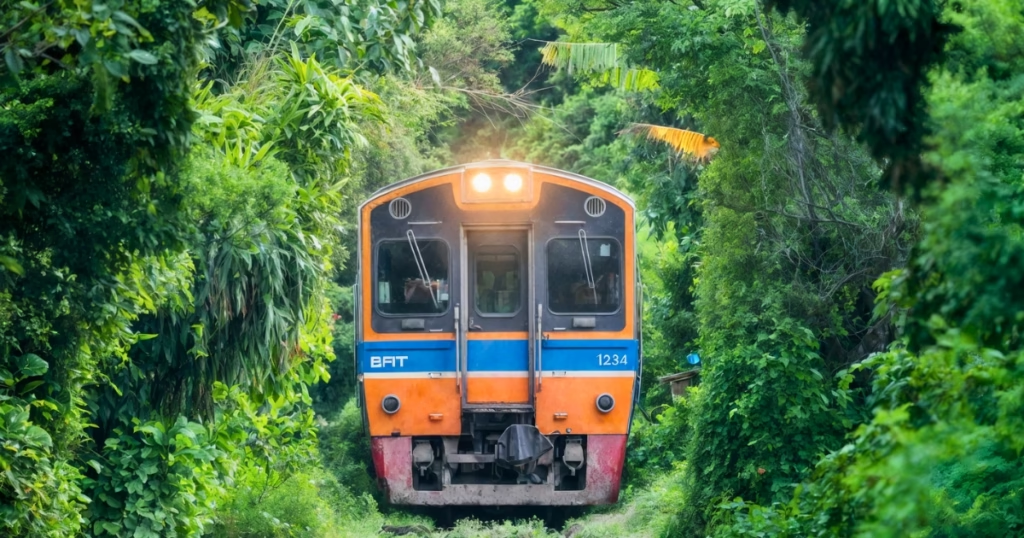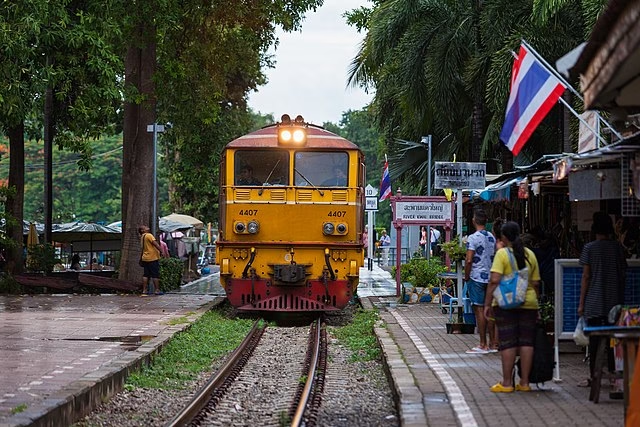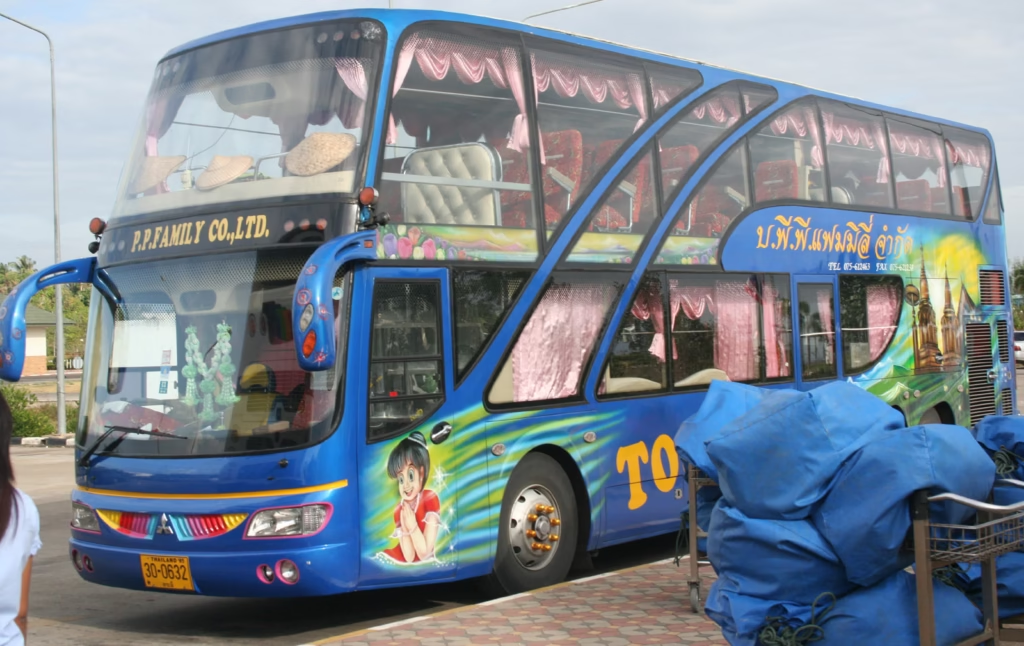Spanning roughly 700 kilometers, the journey from Bangkok to Chiang Mai is one of Thailand’s most traveled routes—and for good reason. Bangkok is the nation’s bustling capital, while Chiang Mai offers a laid-back charm, mountain air, and deep cultural roots that lure travelers seeking a different slice of Thai life.

For first-time visitors or those planning their route through Thailand, the big question is: Should you take the train, the bus, or a quick flight? Each option has its own perks—whether you’re after speed, scenery, savings, or comfort.
In this guide, we’ll break down all three travel options based on cost, convenience, travel time, and overall experience. We’ll also share where and how to book using trusted platforms like 12Go Asia for land travel and Skyscanner for flights—both ideal for travelers looking to secure tickets in advance and compare prices easily
Train: Scenic and Cultural
The train from Bangkok to Chiang Mai is a classic Thai travel experience—ideal for those who enjoy slow, scenic journeys. It’s especially popular with tourists who want to sleep through the night and wake up in a new city.
There are several daily services, but overnight sleeper trains are the most recommended, particularly the #9 Express Train. Trains come in 1st class (private cabins), 2nd class (AC or fan sleepers/seats), and 3rd class (basic wooden seating). Most travelers opt for 2nd class air-conditioned sleepers for the best balance of comfort and cost.

Source: Wikimedia Commons
The journey takes 12–14 hours, and it’s best to book in advance—especially during high season. 12Go Asia is the go-to platform for checking schedules and reserving seats online.
Pros: affordable, scenic, eco-friendly, and a unique local experience.
Cons: long travel time, limited luggage space, and older train models on some routes.
Best for: travelers who aren’t in a rush and want the journey to be part of the adventure.
Bus: Budget-Friendly and Simple
For budget-conscious travelers, taking the bus from Bangkok to Chiang Mai is a straightforward and economical choice. With dozens of daily departures, it’s one of the most accessible ways to make the journey.
Buses depart mainly from Mo Chit Bus Terminal and come in several classes: VIP, First Class, and Standard. VIP buses offer larger reclining seats, onboard toilets, and more legroom—ideal for overnight travel. Night buses are especially popular, allowing you to sleep and save on a night’s accommodation.

Source: Wikimedia Commons
The ride takes around 9–11 hours, depending on traffic and the service you choose. Buses are generally clean and comfortable, but road conditions and driving styles may vary. Booking through 12Go Asia helps ensure you choose a reputable operator and get instant confirmation.
Pros: cheap, frequent, relatively comfortable, and easy to book.
Cons: less space than trains, not ideal for light sleepers, occasional delays due to traffic.
Best for: travelers on a tight budget or making last-minute travel plans.
Flying: Fastest and Most Convenient
If speed is your top priority, flying from Bangkok to Chiang Mai is the way to go. With over a dozen daily flights, it’s the fastest and most convenient option—taking just about 1 hour in the air.
Flights depart from both Suvarnabhumi (BKK) and Don Mueang (DMK) airports. Budget carriers like AirAsia, Nok Air, and Thai Lion Air operate from Don Mueang, while Thai Airways and Bangkok Airways fly from Suvarnabhumi. Depending on traffic and airport logistics, you’ll want to factor in an extra 2–3 hours for check-in, security, and transfers.
Prices can vary widely based on how early you book, but deals are often available through platforms like Skyscanner. Booking in advance during peak season or weekends is strongly recommended.
Pros: very fast, comfortable, widely available.
Cons: airport transfers, baggage limits, and higher carbon footprint.
Best for: travelers on tight schedules, short holidays, or those who prefer comfort and speed.
Quick Comparison: Train vs. Bus vs. Flight
🚆 Train
- Time: 12–14 hours
- Cost: $20–$35
- Comfort: Moderate to high
- Best for: Scenic travel, overnight journeys, cultural experience
🚌 Bus
- Time: 9–11 hours
- Cost: $15–$25
- Comfort: Moderate
- Best for: Budget travelers, last-minute plans, overnight trips
✈️ Flight
- Time: 1 hour (plus 2–3 hours for airport time)
- Cost: $30–$80
- Comfort: High
- Best for: Fast travel, short vacations, families or business trips
Final Tips for a Smooth Journey
Whichever way you choose to travel from Bangkok to Chiang Mai, a little preparation goes a long way. Here are some handy tips to make your trip more comfortable and stress-free:
1. Book in Advance, Especially in Peak Season
During November to February and around Thai public holidays, seats and tickets sell out fast—especially for sleeper trains and flights. Use trusted platforms like 12Go Asia for train and bus tickets and Skyscanner to find flight deals and compare airlines.
2. Pack Smart for the Ride
For trains and buses, bring a travel pillow, light blanket or hoodie (AC can get chilly), and snacks or water. If you’re taking a flight, remember that budget airlines often charge extra for checked baggage—so pack light or prepay online.
3. Stay Safe and Comfortable
On night journeys, keep valuables close and use a money belt or lockable bag. If you’re prone to motion sickness, consider medication for bus or train rides. For all options, using earplugs or noise-cancelling headphones can make a big difference.
4. Respect Local Travel Etiquette
Whether you’re on a train with locals or boarding a domestic flight, a little respect goes a long way. Keep noise to a minimum, offer your seat to elders if needed, and dress modestly, especially when traveling in rural areas.
5. Enjoy the Ride
Don’t rush it—Thailand is just as much about the journey as it is the destination. Whether you’re gazing out of a train window at rice paddies or flying over northern mountains, take a moment to enjoy the view.

One Response